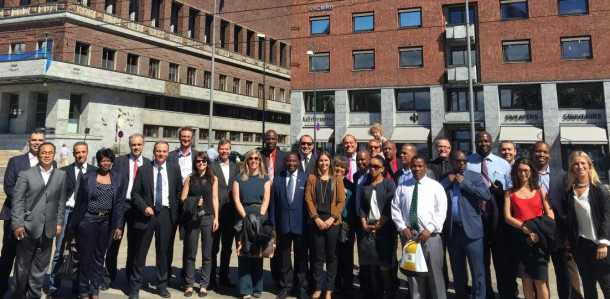 Photo credit: www.uraia.org
Photo credit: www.uraia.org
METROPOLIS joins the creation of URAIA Platform at its first annual meeting
On June 29th and 30th 2015, the Uraía Platform organized its first capacity building activity in Oslo, Norway, on “Public-Private Partnerships Negotiation for SMART City Management”.
More than 35 representatives from local governments and their associations, private sector, research centers, civil society and international organizations from Europe, Africa, Latin America and Asia, participated in the first Capacity-building Workshop of the Uraía Platform on Public-Private Partnerships Negotiation for SMART City Management in Oslo on June 29 and 30 organized in partnership between FMDV and UN-Habitat.
METROPOLIS, as the World Association of Major Metropolises, was invited to present its experience in the field of application of new technologies to improve urban management through one of its 13 initiatives: "Smart, sustainable and inclusive slum development". Renu Khosla, Director at CURE (Center for Urban and Regional Excellence), was in charge of presenting the project that is leading the Indian city of Agra and is developing a new interface on mobile phones to instigate public participation in slum communities.
During the two-day Workshop - including a field visit to Oslo’s SMART City initiatives, panel discussions, round tables and informal discussions -, the participants shared their experiences and knowledge on negotiating and implementing Public-Private Partnerships (PPPs) in the field of SMART technologies for improving public services. The representative from the City of Porto Alegre (Brazil), for example, shared its Open Data policy called “Data PoA”. The representative from the Municipality of Kinondoni, Tanzania, shared its program to collect taxes through a mobile phone application. The City of Johannesburg, South Africa, spoke about its experience of establishing a PPP contract in public lightning. Representatives from the private sector as Veolia or Change Tomorrow presented their work with local governments. Representatives from institutions such as Nomadéis, OCDE or Instituto Superiore Mario Boella, gave specific recommendations on how local governments should implement PPPs for SMART management. Some of these recommendations are: the careful evaluation of the local government’s capacities; a balanced distribution of risks and potential benefits between city administrations, the private stakeholder and citizens; the careful examination of the business partner, and the adaptation of PPP frameworks to technological innovations in fast-changing contexts.
The Workshop highlighted common concerns and shared difficulties, the need for fostering experience exchange and dialogue between the private and public sector as well as among cities that often face similar problems and challenges in the negotiation of PPPs and in the provision of public services. The informal, participatory and inclusive format of the Workshop allowed for engaging discussions and an in-depth analysis of the needs of local governments in the process of establishing and implementing PPPs involving SMART technologies.
The discussions of the Workshop will inform a set of Guidelines aiming at supporting local governments in their negotiation of contracts with the private sector for the implementation of SMART technologies applied to municipal management. It should establish a roadmap with main steps to prepare and negotiate a PPP contract, keys elements of success, main risks and difficulties encountered and mistakes to avoid.
For more information: http://www.uraia.org/activities/service/capacity-building-activities
URAIA’s beginnings
URAIA was created in June 2014 in Santander (Spain) by UN-Habitat and the FMDV, both collaborators of METROPOLIS, in order to respond to the needs of the cities to share experiences, successes and failures with other public administrations building more connected, efficient and inclusive territories.

